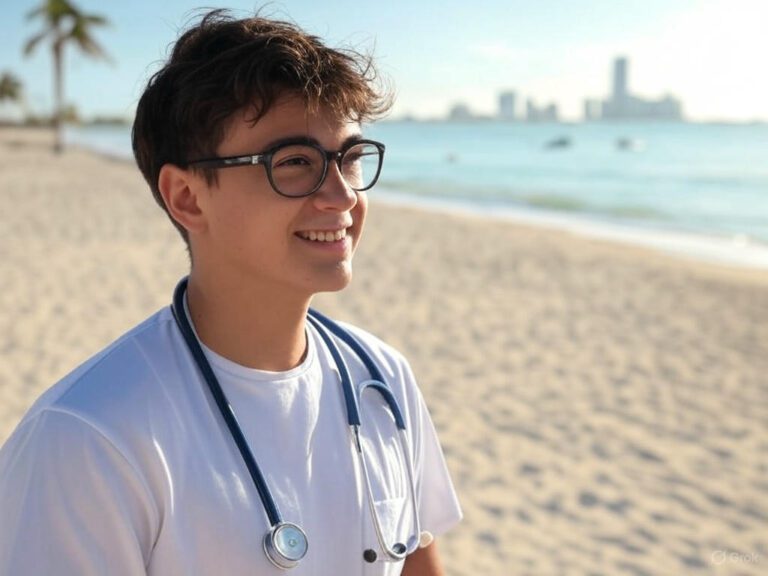introduction
Obtaining a medical license in Florida is a critical step for healthcare professionals aspiring to practice in the Sunshine State. With its growing population and robust healthcare sector—serving over 22 million residents and millions of tourists annually—Florida offers immense opportunities for physicians. However, the licensure process is rigorous, designed to ensure that only qualified individuals provide safe and effective care.
According to the Florida Department of Health, over 128,000 new healthcare practitioners were licensed in the 2022-23 fiscal year. This reflects the state’s high demand for medical professionals. This comprehensive guide outlines the steps, requirements, and challenges involved in securing a Florida medical license. Empowering you to navigate the process with confidence.
A medical license isn’t just a legal requirement; it’s a testament to a physician’s competence and commitment to patient safety.
As Dr. Jennifer Sanchez, a practicing physician in South Florida, notes, “Getting licensed in Florida was challenging, but it opened doors to a rewarding career serving diverse communities.” Whether you’re a recent medical school graduate, an international medical graduate (IMG), or a seasoned physician relocating to Florida, this guide provides the roadmap to achieving licensure.

eligibility requirements for medical license in florida
To qualify for a medical license for Florida, applicants must meet stringent eligibility criteria set by the Florida Board of Medicine (for MDs) or the Florida Board of Osteopathic Medicine (for DOs). These requirements ensure that physicians possess the education, training, and ethical standing to practice safely.
educational qualifications
- Medical School Graduation: Applicants must graduate from a recognized medical school accredited by the Liaison Committee on Medical Education (LCME) for MDs or the American Osteopathic Association (AOA) for DOs. International medical graduates (IMGs) must hold a valid Educational Commission for Foreign Medical Graduates (ECFMG) certificate, which verifies their medical education credentials.
- Postgraduate Training: At least one year of postgraduate training in a program accredited by the Accreditation Council for Graduate Medical Education (ACGME) or AOA is required. IMGs need a minimum of two years of residency training in one specialty area.
examinations
- MD Applicants: Must pass all three steps of the United States Medical Licensing Examination (USMLE). For older applicants, the Federation Licensing Examination (FLEX) or National Board of Medical Examiners (NBME) exams.
- DO Applicants: Must pass all three levels of the Comprehensive Osteopathic Medical Licensing Examination (COMLEX-USA). The Florida Board of Osteopathic Medicine does not accept USMLE or FLEX as equivalents due to their lack of osteopathic components.
- Time Limits: Applicants must complete the USMLE or COMLEX within seven years of passing the first step or level. Though exceptions may apply for board-certified physicians or those in combined MD/PhD programs.
additional certificates
- ECFMG Certification for IMGs: Requires verification of medical degree and transcripts, plus passing USMLE Steps 1 and 2.
- Specialty Board Certifications: Optional but can strengthen an application, especially for licensure by endorsement.
- Active Practice: Applicants must have practiced medicine for at least two of the last four years. You will also need to pass the Special Purpose Examination (SPEX) if inactive.
application process for medical license in florida
Applying for a medical license for Florida involves a detailed process. Managed by the Florida Department of Health’s Division of Medical Quality Assurance (MQA). The application is 27 pages long and requires comprehensive documentation. Below is a step-by-step guide:
1. complete the application form
- Access the application on the Florida Board of Medicine’s website for MDs or the Florida Board of Osteopathic Medicine’s website for DOs.
- Provide detailed information on identity, residence, education, employment, health history, criminal history, and malpractice claims.
- Include a written explanation for any revoked, suspended, or restricted licenses.
2. gather required documentation
- Official medical school transcripts.
- Verification of postgraduate training from program directors.
- USMLE or COMLEX score reports.
- ECFMG certificate (for IMGs).
- Proof of specialty board certifications (if applicable).
- Valid government-issued ID.
- Translations for foreign documents, prepared by certified translators on letterhead with seals.
3. submit fingerprints for background check
- Use an FDLE-approved Livescan service provider to submit fingerprints. Find providers at flhealthsource.gov/background-screening.
- Ensure the correct Originating Agency Identification (ORI) number is used to direct results to the MQA.
4. pay fees
- Non-refundable application fee: $350.
- Initial license fee: $355 (reduced to $205 for residents/fellows).
- Neurological Injury Compensation Association (NICA) fee: $250–$5,000, depending on specialty.
- Fingerprinting and verification fees: Vary by provider.
5. submit the application
- Apply online via the MQA Online Services Portal or mail a paper application to: Division of Medical Quality Assurance, P.O. Box 6320, Tallahassee, FL 32314-6320.
- Ensure all sections are complete to avoid delays. The MQA promises to review initial applications within 30 days.
6. monitor application status
- Check status online at flhealthsource.gov.
- Expect a response within 1–3 days for MDs/DOs. Though full licensure may take 2–6 months, longer if malpractice or criminal history is reported.
examinations and assessments for medical license for florida
The USMLE and COMLEX are cornerstone requirements for medical licensure for Florida, assessing a physician’s knowledge, skills, and readiness to practice.
USMLE (for mds)
Structure: A three-step exam series:
- Step 1: Tests basic medical sciences (e.g., anatomy, physiology).
- Step 2 CK: Evaluates clinical knowledge across specialties.
- Step 3: Assesses ability to apply medical knowledge in unsupervised practice.
- Preparation: Use resources like UWorld, First Aid, and NBME practice exams. Study schedules typically span 3–6 months per step.
- Timeline: Most complete Steps 1 and 2 during medical school and Step 3 during residency. All steps must be passed within seven years.
COMLEX (FOR DOS)
Structure: A three-level exam with an osteopathic focus:
- Level 1: Covers foundational biomedical sciences and osteopathic principles.
- Level 2 CE: Tests clinical knowledge.
- Level 3: Evaluates clinical decision-making.
- Preparation: Resources include COMBANK, COMQUEST, and Savarese’s OMT Review. Dedicate 3–6 months per level.
- Timeline: Similar to USMLE, with Levels 1 and 2 taken during medical school and Level 3 during residency.
additional assessments
- SPEX: Required for physicians inactive for two of the last four years.
- Florida Laws and Rules: Applicants must demonstrate knowledge of Florida’s medical laws, often via the Multistate Pharmacy Jurisprudence Exam (MPJE) for certain specialties.
tips for success
- Start early to allow time for retakes (up to four attempts per step/level, with a fifth considered upon appeal).
- Join study groups or enroll in prep courses for structured learning.
- Schedule exams during less demanding periods of training.
background checks and fingerprinting for medical license in florida
Florida mandates a thorough background check for all medical license applicants to ensure patient safety. Since January 1, 2013, this includes fingerprint-based screening.
process
- Fingerprint Submission: Use an FDLE-approved Livescan provider. Submit fingerprints electronically with the correct ORI number.
- Screening Scope: The Florida Department of Law Enforcement (FDLE) and FBI check for Florida and national criminal history records.
- Cost: Applicants bear all costs, typically $50–$100, depending on the provider.
- Results: Sent to the Care Provider Background Screening Clearinghouse and shared with the MQA.
what's checked
- Criminal convictions, including felonies and misdemeanors.
- Disciplinary actions from other state medical boards.
- Malpractice claims or lawsuits (reported in the application).
impact on application
- A criminal record or malpractice history may delay licensure or require additional documentation, such as written explanations or legal records.
- Serious offenses (e.g., crimes related to healthcare) may lead to denial, though applicants can appeal.
tips
- Submit fingerprints early to avoid delays.
- Disclose all relevant history in the application to prevent accusations of misrepresentation.
continuing education requirements for medical license for florida
Maintaining a Florida medical license requires ongoing education to ensure physicians stay current with medical advancements. The Florida Board of Medicine and Board of Osteopathic Medicine mandate continuing medical education (CME) every two years.
cme requirements
MDs: 40 hours of CME per biennial cycle, including:
- 2 hours on Prevention of Medical Errors (approved by state or AMA Category I/II providers).
- 2 hours on Domestic Violence (every third renewal cycle).
- 1 hour on HIV/AIDS (first renewal only).
- DOs: 40 hours, with similar mandatory courses, plus 15 hours in osteopathic-specific topics.
- Reporting: Submit CME hours via CEBroker.com before renewal.
waivers and exemptions
- Physicians volunteering 160 hours (or 800 if retired) for indigent care may waive up to 25% of CME hours and renewal fees.
- Primary care physicians posting a schedule of charges may be exempt from one cycle’s CME and fees.
- Mandatory courses (e.g., medical errors, domestic violence) cannot be waived.
resources
- Access free CME through the University of Florida or myCME.com.
- Verify provider approval with the Florida Department of Health.
common challenges and faq
The licensure process can be daunting. Below are common challenges and answers to frequently asked questions.
challenges
- Incomplete Applications: Missing documents or errors can delay processing. Double-check all submissions.
- Background Check Delays: Incorrect ORI numbers or backlog at FDLE can slow results.
- Malpractice or Criminal History: These require additional documentation, extending timelines.
- IMG Requirements: ECFMG certification and two-year residency mandates pose hurdles for international graduates.
FAQ
- How long does licensure take? Typically 2–6 months, longer with complications.
- What are the total costs? Expect $705–$5,705, including application, license, NICA, and fingerprinting fees.
- Can I practice without a license? No, Florida law requires a valid license for patient care.
- What if I fail an exam? Up to four attempts are allowed per step/level; a fifth requires board approval.
- How do I appeal a denial? Submit a written appeal to the Florida Board of Medicine within 30 days, including supporting evidence.
renewal and maintenance of medical license for florida
Florida medical licenses are renewed biennially, with MD licenses expiring on January 31 (Group 1: even years; Group 2: odd years) and DO licenses on March 31 of even years.
renewal process
- Receive Notification: The MQA mails a renewal postcard 90 days before expiration.
- Report CME: Log 40 hours of CME on CEBroker.com.
- Complete Application: Submit online via the MQA Online Services Portal, updating personal and practice information.
- Pay Fees:
– Renewal fee: $379 if before expiration, $729 if after.
– Delinquent fee: Additional $100 if renewing late.
– NICA and dispensing practitioner fees may apply. - Submit Fingerprinting: Required for renewals after July 1, 2025, per new regulations.
deadlines
- Renew by midnight on expiration day to avoid delinquent status.
- Delinquent licenses become null and void after two years, requiring reapplication.
tips
- Update your mailing address with the MQA to receive notifications.
- Complete CME early to avoid last-minute stress.
- Check license status at flhealthsource.gov.
doctor-agent partnerships
For newly licensed doctors, partnering with a local insurance agent offers significant advantages. Local agents provide personalized service, taking the time to understand a physician’s unique needs and offering tailored insurance solutions for your clientele, such as: Major medical coverage, supplemental health plans, or healthcare crowdfunding—that align with the vision of your practice.
Our in-depth knowledge of the local market ensures competitive rates and relevant options, while our expertise in local-based marketing helps to ensure your practice is found online by the community. This dedicated support empowers medical professionals to focus on patient care with confidence, knowing their insurance needs are expertly managed.
conclusion
Securing a medical license for Florida is a challenging but achievable goal for dedicated healthcare professionals. By meeting eligibility requirements, navigating the application process, passing required exams, and fulfilling CME obligations, you can join the ranks of Florida’s esteemed physicians.
The state’s rigorous standards ensure that only the most qualified practitioners serve its diverse population. Making licensure a badge of honor. Start your journey today by visiting the Florida Board of Medicine or Florida Department of Health websites for application forms and resources.
As Dr. Sanchez advises, “Stay organized, be patient, and keep your eyes on the prize—a fulfilling career in Florida’s vibrant healthcare landscape.”
additional resources
- Florida Board of Medicine: flboardofmedicine.gov
- Florida Board of Osteopathic Medicine: floridasosteopathicmedicine.gov
- Florida Department of Health: floridahealth.gov
- Florida Medical Association: flmedical.org
- ECFMG: ecfmg.org
- CEBroker: cebroker.com
- Livescan Providers: flhealthsource.gov/background-screening
This blog post is for informational purposes only and does not constitute legal or professional advice. Always consult the Florida Board of Medicine or a qualified attorney for guidance on medical licensure.

